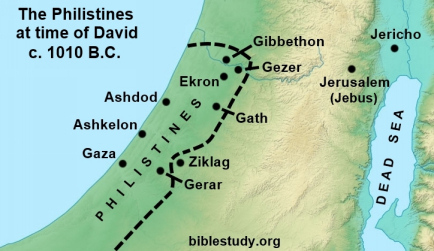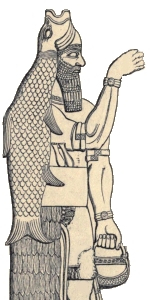The history between the Philistines and Israel goes back to the Exodus. God could have commanded his people, right after leaving Egyptian bondage, to travel directly to the Promised Land through Philistine territory. He opted, instead, to have Israel journey south toward the Red Sea in order to avoid a possible war with those who would eventually become their hardened enemy.
When Pharaoh let the people go, God did not lead them along the road to the land of the Philistines, even though it was nearby; for God said, "The people will change their minds and return to Egypt if they face war." So He led the people around toward the Red Sea . . . (Exodus 13:17 - 18, HCSB).
A Formidable Adversary
Below are some of the major reasons the Philistines were ancient Israel's determined and protracted enemy.
1) They trained their children, at an early age, in the art of war (1Samuel 17:33).
2) The Philistine cities of Gaza, Gath and Ashdod housed giant enemy warriors known as the children of Anak (Anakim, Numbers 13:28, 33, Joshua 11:22). Goliath, for example, who lived in Gath, was conservatively 9 feet 6 inches tall (2.9 meters), wore a battle coat weighing 80 pounds (36.2 kilograms) and threw a spear with a 17-pound (7.7 kilogram) head! David and the men of Israel fought these giants on several occasions (1Samuel 17, 2Samuel 21:15 - 20).

3) The Philistines took advantage of the latest technology and used it in battles (Judges 1:19, 1Samuel 13:19 - 20). They were also willing to take military risks and carry out repeated offensives against their foes).
4) They sought to exploit any weakness or distraction on the part of their enemy. For example, they launched an invasion of Israel when King Saul was foolishly pursuing David in the wilderness (1Samuel 23:24 - 28).
5) The pagan Philistines (Judges 14:3, 1Samuel 14:6), who did not worship or obey the one true God of Israel, were a violent race willing to perform sometimes gruesome acts to strike fear into the hearts of their enemy.
Brutal Behavior
How brutal was this enemy of Israel? When the Philistines finally discovered Samson's weakness, they overpowered and arrested him. They then proceeded to gouge his eyes out from their sockets and made him (no doubt in excruciating pain) grind grain in a prison (Judges 16:21).

The Philistines, after years of battling Israel's King Saul, were finally able to overcome and kill both him and three of his sons on Mount Gilboa. They celebrated their greatest success by chopping off Saul's head and sending this gruesome war trophy on a victory tour throughout their land. When the head completed its tour, they hung it in up in their temple dedicated to Dagon.
In order to further advertise the victory they felt Dagon gave them, the Philistines fastened Saul's headless corpse, along with the bodies of his sons (one of which was David's close friend Jonathan), to the wall surrounding Israel's city of Beth-shan (1Chronciles 10:8 - 10, 1Samuel 31:8 - 13).
The Lord personally condemned this heartless enemy for kidnapping Judah's children and selling them as slaves to the Greeks (Joel 3:4 - 8).
Rising from Defeat
The Philistines were a people who repeatedly rose from the ashes of defeat and, like the mythical Phoenix bird, came back to fight another day.
After Joshua's death, the tribe of Judah battles the Philistines and takes their major cities of Gaza, Askhelon, and Ekron. The enemy regroups, however, and in a short time retakes its territory from Israel (Judges 1:18 - 19, 3:1 - 3).
The efforts of Samson significantly weaken Philistine aggression (Judges 14 - 16). In just a few years after his death, however, they humiliatingly defeat Israel's army on two separate occasions. They kill 34,000 Israelites, including the High Priest's two sons, and capture the Ark of the Covenant (1Samuel 4).
David and his men battle the Philistines an astonishing thirteen times (1Samuel 17, 18:17 - 27, 19:8, 23:1 - 5, 2Samuel 5:17 - 25, 21:15 - 20, 23:9 - 16). His victories destroy their ability to make war (1Chronicles 18:1) for at least 130 years. In 843 B.C., however, they and their Arab allies fight their way to Jerusalem, capture royal prisoners and then ransack the palace (2Chronicles 21:16 - 17).
God's Judgment
God's righteous judgment against the greatest enemy of Israel is in proportion to her great sins.
Thus says the Lord God, "Because the Philistines have taken vengeance; yes, have taken vengeance with spite in their heart, to destroy it (His people) with never ending hatred . . . Behold, I will stretch out My hand on the Philistines . . . and will destroy the rest of the sea coast. And I will execute great vengeance on them . . ." (Ezekiel 25:15 - 17, HBFV).